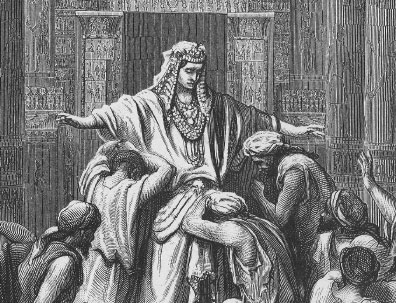Mar
31
2011

or The Disunited State of Samaria
“…and they are seven kings;
five have fallen,
one is,
the other has not yet come;
and when he comes,
he must remain a little while.” (Revelation 17:10)
Time for another weird one. Although it’s probably only weird to the conservative evangelical Bible scholars among us. [1]
Albert’s post on marriage the other day allows us to see the context of the sin of the Samaritan woman. James Jordan observes that this woman was most likely a victim of this unjust system, hence the other Samaritans’ readiness to believe her testimony.
Continue reading
4 comments | tags: John, John Barach, Ralph Smith, Revelation, Typology, Warren Gage | posted in Biblical Theology, Quotes
Nov
9
2010

The Wrong Kind of Blood, the Wrong Kind of Spirit
These six things the LORD hates, Yes, seven are an abomination to Him:
…..A proud look,
……….A lying tongue,
……………Hands that shed innocent blood,
………………..A heart that devises wicked plans,
……………Feet that are swift in running to evil,
……….A false witness who speaks lies,
…..And one who sows discord among brethren. (Proverbs 6: 6-19)
Although Revelation describes two women, there was really only one. Solomon dealt with two prostitutes who lived in the same house. What Revelation does is cut the prostitute in two. At Atonement, Rahab was separated from Jericho; Mary Magdalene was delivered of her seven demons. Peter Leithart writes:
“Mary Magdalene functions in the same way in John’s gospel. She had seven demons (like Israel in Jesus’ parable!), but by the end of the book has become a new Eve, recognising Jesus as the New Adam in the garden of the resurrection. Since she is new Eve, it is entirely appropriate that Jesus call her ‘Woman’.” [1]
Continue reading
1 comment | tags: Covenant Theology, Feasts, James Jordan, Numbers 5, Peter Leithart, Revelation, Solomon, Systematic typology, Warren Gage | posted in Bible Matrix, Biblical Theology, Quotes, The Last Days
Aug
11
2010
The Art of Interpretation

Oh, the depth of the riches and wisdom and knowledge of God! How unsearchable are his judgments and how inscrutable his ways! (Romans 11:33)
Hermeneutics is a big word you learn at Bible College. It is the study or practice of interpreting texts in the areas of literature, law and religion.
In literature, discovering the intent of an author can be an enlightening game. In law, one’s life (or life sentence) can hang in the balance of a judge’s interpretation. In religion, besides plumbing the depths of the mind of God, it is an enlightening game in the balance of which many lives hang. God has revealed His mind in His Word, and has also seen fit to give to His people the often difficult job of interpreting it.
[This post has been refined and included in Sweet Counsel: Essays to Brighten the Eyes.]
Continue reading
Comments Off | tags: Ezekiel, Hermeneutics, John, Literary Structure, Revelation, Timothy, Typology, Warren Gage | posted in Biblical Theology
Nov
26
2009

Warren Gage/Christopher Barber and then James Jordan on Joseph’s wisdom:
“How strange Joseph’s behaviour toward his brothers appears to a modern reader! He recognises his brothers immediately but maintains his Egyptian disguise. He speaks harshly to them and then only through an interpreter. He charges them with spying — a capital crime for which he can sentence them to death. He takes one brother as a hostage. He returns their silver as they go home for the first time, and then he sets the brothers up in order to accuse them of stealing his silver cup on their second return trip, at which point he has them arrested. In short, he terrifies them.
What does this all mean? Is Joseph seeking revenge? Clearly that is not the case, for he so loves them he can hardly restrain himself fom revealing his identity — and his forgiveness — to them. Surely he is not vengeful. Why does he act this way? And why does the text go to such lengths to describe all of this?
Continue reading
Comments Off | tags: Dominion Theology, Forgiveness, Genesis, Jacob, James Jordan, Joseph, Warren Gage, Wisdom | posted in Biblical Theology, Christian Life, Quotes
Oct
20
2009
or Submissible Evidence According to Paul

“…it is instructive that when the issue was so decisively drawn with his legalist opponents, Paul, at the climax of his argument, appealed to an allegory to refute the gainsayers of grace…”
Warren Gage writes:
Continue reading
Comments Off | tags: Galatians, Hermeneutics, Paul, Typology, Warren Gage | posted in Biblical Theology, Quotes
Jul
7
2009

A quote from Theological Poetics: Typology, Symbol and the Christ, by Warren Gage of Knox Seminary:
A modern introduction to biblical typology should begin inductively with several examples of certain shadows and types from Old Testament passages widely acknowledged to be prefigurative in character, seeking to understand those types as interpreted by the authors of the New Testament. After a number of such passages are examined, an index of the “criteria of certainty” should be proposed to distinguish legitimate “types” from suspected “allegories.” Principles of interpretation should then be announced, along with the obligatory caveats necessarily qualifying tentative proposals, all of which should be rationally defensible and clearly recognizable to reputable scholarship in the field.
Our approach will be quite different. Continue reading
2 comments | tags: Modernism, Typology, Warren Gage | posted in Biblical Theology, Quotes
Jun
27
2009
or Silencing the Higher Critics

Yet more on literary analysis of the Bible as a ‘terrible marvel‘; a review of two books. As Warren Gage has commented, we are on the verge of a tremendously creative time in Biblical theology. But this to me seems also to be an element of scholarship returning home, older and wiser, from a wilderness of unbelief.
Genesis: The Story We Haven’t Heard
by Paul Borgman. Downers Grove, IL: Intervarsity Press, 2001. 252 pages.
The Literary Structure of the Old Testament: A Commentary on Genesis-Malachi
by David A. Dorsey. Grand Rapids, MI: Baker Books, 1999. 330 pages.
Reviewed by Timothy Paul Erdel, Ph.D., Archivist and Assistant Professor of Religion and Philosophy, Bethel College, Mishawaka, IN.
“I have been fascinated by the primal power of Old Testament stories for as long as I can remember. From my perspective, there is no clearer window on human character, no greater storehouse of hard and holy truths. Yet some tales are deeply disturbing. Phyllis Trible calls them ‘texts of terror.’ Even the most familiar passages may seem strangely distant. So I relish each time a preacher or teacher sheds new light on these ancient Hebrew narratives.
Continue reading
Comments Off | tags: Abraham, Babel, C. S. Lewis, Chiasm, Compromise, David A. Dorsey, Higher Criticism, Isaiah, Jeremiah, Literary Structure, Warren Gage | posted in Biblical Theology, Quotes
Jun
20
2009
 or Systematic and Biblical Theologies
or Systematic and Biblical Theologies
More on typology. A helpful picture.
Tim Challies summarises Gage and Barber’s approach in their study guide on Genesis 37-50:
“I have learned to expect to be underwhelmed with study guides. Sadly, it was with this expectation that I began to read The Story of Joseph and Judah, a guide written by Warren Gage, Associate Professor of Old Testament at Knox Theological Seminary and Christopher Barber, a lawyer who is also a graduate of Knox Theological Seminary. I am glad to say that this guide, which promises to provide a ‘fresh look at Genesis 37-50,’ does just that and does it very well.
Continue reading
Comments Off | tags: Joseph, Judah, Tim Challies, Typology, Warren Gage | posted in Biblical Theology, Quotes
Jun
20
2009

or Typology: Deadly Weapon or game of Scattergories?
“Chiastic literary analysis has completely destroyed liberal literary criticism. Liberalism is in tatters, bleeding and dying. Liberalism cannot survive Dorsey’s chiastic proof of the total unity of Isaiah, for instance. Dorsey finds loads of 7-fold chiasms in the Bible. I’ve found scores more, quite independently. What Dorsey does not see is that these are recaps of the chiasm of the 7 days in Genesis 1. And that’s good, because it means he did not go through the Bible forcing passages into heptamerous chiasms. He just found them there, and others can see that these track Genesis 1 as ‘new creation’ passages.”
—James B. Jordan, A Reply on the Nature of the Psalter, Biblical Horizons blog, biblicalhorizons.wordpress.com, referring to David A. Dorsey, The Literary Structure of the Old Testament.
If chiastic literary analysis (along with typology as I posted recently) is such a powerful weapon against a modernist interpretation of the Bible, why are these methods of study shunned by those who oppose liberal theology? Why are theologians hauled over the coals for using it if it leaves the enemy in shreds?
Continue reading
4 comments | tags: David A. Dorsey, David Field, Liberal theology, Peter Leithart, Systematic typology, Typology, Warren Gage | posted in Apologetics, Biblical Theology, Totus Christus


































